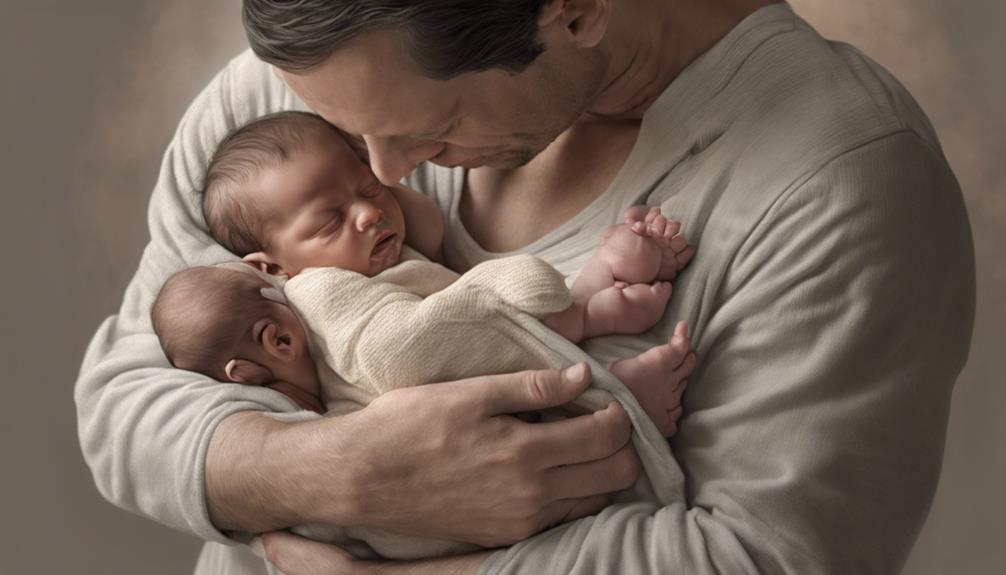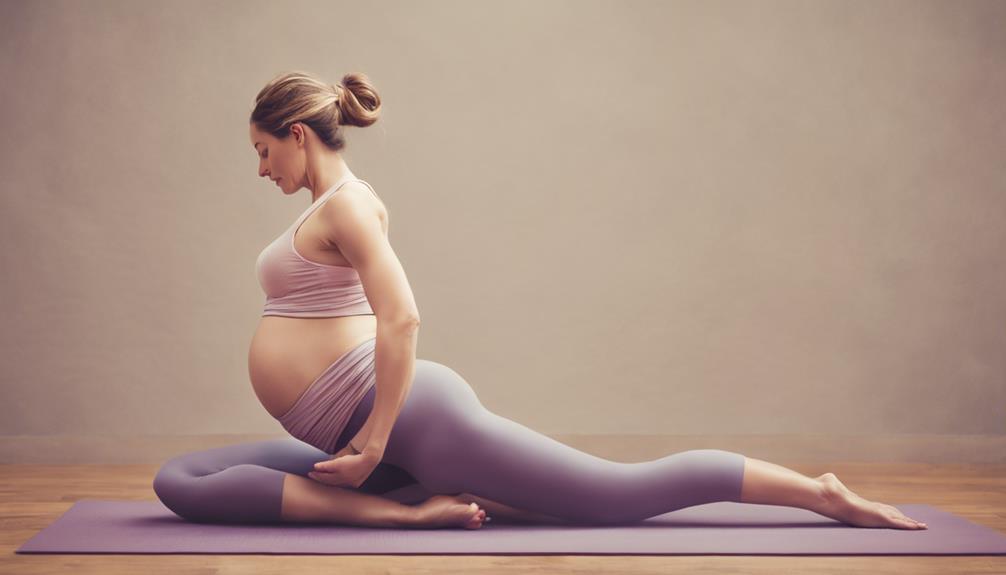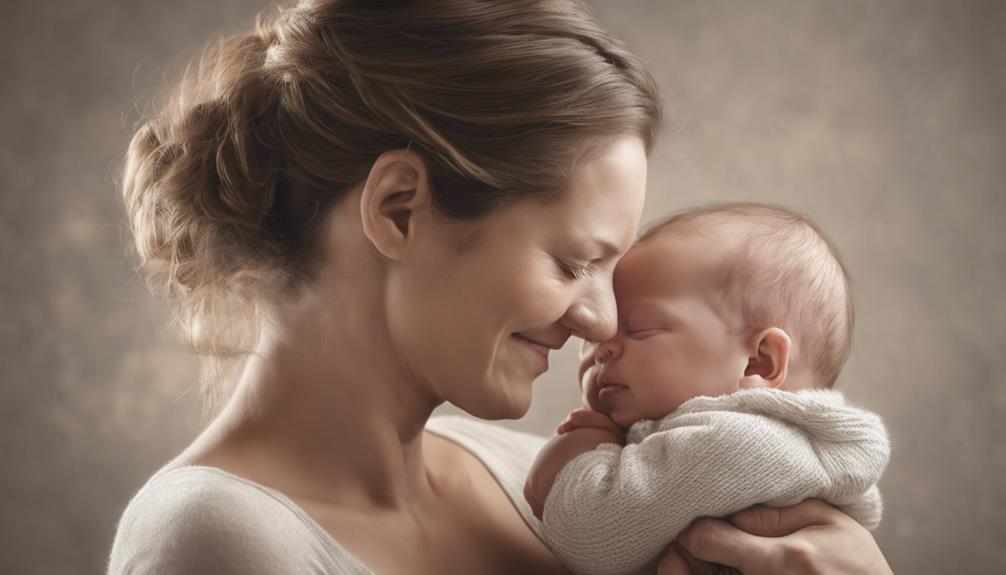Have you ever wondered how to gently ease your newborn's hiccups without causing them distress?
There are simple and effective ways to provide comfort and relief to your little one when hiccups strike.
By employing gentle techniques and understanding the root causes, you can navigate this common occurrence with ease.
Key Takeaways
- Pat or rub the baby's back to release trapped air and prevent hiccups.
- Use pacifiers to relax diaphragm muscles and divert attention from hiccups.
- Hold the baby upright post-feeding to aid digestion and reduce reflux.
- Opt for an upright feeding position and burp frequently to prevent future hiccups.
Understanding Newborn Hiccups
When understanding newborn hiccups, it's important to recognize that they're typically caused by diaphragm spasms or irritation, leading to rapid breathing movements. Your baby's diaphragm, a key muscle responsible for breathing, can sometimes spasm, causing those adorable yet sometimes concerning hiccups.
These hiccups are common in babies and often resolve on their own, so there's usually no need to worry. During or after feeding, hiccups may make an appearance due to swallowing air or the excitement of mealtime. To help prevent or stop your baby's hiccups, ensuring a calm feeding environment and using proper feeding techniques are essential.
Burping your baby during feeding can release trapped air, reducing the chances of hiccups. Additionally, offering a pacifier or gently rubbing your baby's back may help relax the diaphragm and alleviate those vocal interruptions.
Gentle Burping Techniques

If your newborn is experiencing hiccups, mastering gentle burping techniques can be key to soothing their discomfort and helping them settle after feedings. Burping is important as it helps release trapped air in the stomach that might trigger those pesky hiccups.
To effectively burp your baby, try gently patting or rubbing their back after each feeding session. Remember, frequent burping during and after feeds can prevent hiccups and reduce your little one's discomfort.
Make sure to hold your baby in an upright position while burping to aid in expelling air and alleviate hiccups. Proper burping not only helps in releasing trapped air but also prevents fussiness and keeps your newborn comfortable.
Pacifiers for Soothing

To soothe your newborn's hiccups gently, consider utilizing pacifiers as a calming aid. Pacifiers are a valuable tool to help ease your baby's discomfort and provide relief from persistent hiccups. Here's why pacifiers can be beneficial:
- Relaxing Diaphragm Muscles: The sucking motion while using a pacifier can help relax the diaphragm muscles, potentially aiding in stopping hiccups.
- Diverting Attention: Sucking on a pacifier can divert your baby's attention, shifting focus from the hiccups and promoting relaxation.
- Gentle and Non-invasive: Pacifiers offer a gentle and non-invasive method to soothe your newborn's hiccups without causing any harm or discomfort.
- Comfort and Relief: The sucking action on a pacifier not only helps in regulating breathing but also provides comfort, offering a soothing sensation that may help alleviate hiccups effectively.
Positioning for Relief

Consider adjusting your newborn's positioning to help provide relief from hiccups, as proper posture can aid in easing discomfort and promoting comfort. When soothing your baby's hiccups, holding them upright against your chest allows trapped air to escape, offering relief. Placing your little one in a slightly upright position during and after feeding can help reduce the occurrence of hiccups. Supporting your baby's head and neck while holding them upright is essential for effectively soothing hiccups. Using a baby carrier or sling to keep your infant in an upright position can provide comfort and alleviate hiccups. Remember to keep your baby upright for at least 20-30 minutes after feeding to aid digestion and reduce reflux, preventing future hiccups. This gentle positioning technique will not only help relieve hiccups but also create a calming environment for your baby.
| Positioning Tips | Benefits |
|---|---|
| Hold upright against your chest | Allows trapped air to escape easily |
| Slightly upright during feeding | Reduces occurrence of hiccups |
| Support head and neck | Aids in effective hiccup soothing |
| Use baby carrier or sling | Provides comfort and alleviation |
Preventing Future Hiccups

Help your newborn avoid future hiccups by implementing simple feeding and burping strategies.
- Burping: Remember to burp your baby frequently during feedings to release trapped air and prevent hiccups.
- Upright Position: Opt for feeding your baby in an upright position to aid digestion and lessen the chances of hiccups occurring.
- Frequent Feedings: Offering smaller and more frequent feedings can prevent overeating, reducing the likelihood of hiccups.
- Proper Latch and Nipple: Make sure a good latch during breastfeeding and use a slow-flow nipple on bottles to help prevent hiccups in your little one.
Frequently Asked Questions
What Position Is Best for Newborn Hiccups?
When soothing newborn hiccups, hold your little one upright against your chest. This position relaxes the diaphragm, reducing hiccups. Pat their back gently while they're over your shoulder to aid in relieving those spasms.
How Do I Relieve My Newborns Hiccups?
You can help relieve your newborn's hiccups by burping them, offering a pacifier, gently rubbing their back, or changing their position. Avoid adult remedies like breath-holding or sudden scares. Your baby's comfort is key.
What to Do if Baby Has Hiccups at Night?
When your baby has hiccups at night, gently pat or rub their back, offer a pacifier to suck on, elevate their head, avoid feeding right before bed, and establish a calming bedtime routine to help ease hiccups.
Is It OK to Lay Baby Down With Hiccups?
Yes, it's okay to lay your baby down with hiccups. They usually pass in 5-10 minutes. Monitor their breathing while they rest. If hiccups persist or cause discomfort lying down, briefly hold them upright for relief.
Conclusion
Remember, newborn hiccups are common and usually harmless. By using gentle techniques like burping and offering a pacifier, you can help soothe your little one.
Did you know that newborns hiccup on average 1-4 times a day? Stay calm and patient, and remember that these hiccups will eventually pass.
If you have any concerns or if hiccups persist, don't hesitate to consult your healthcare provider for guidance. Your baby's well-being is always the top priority.










